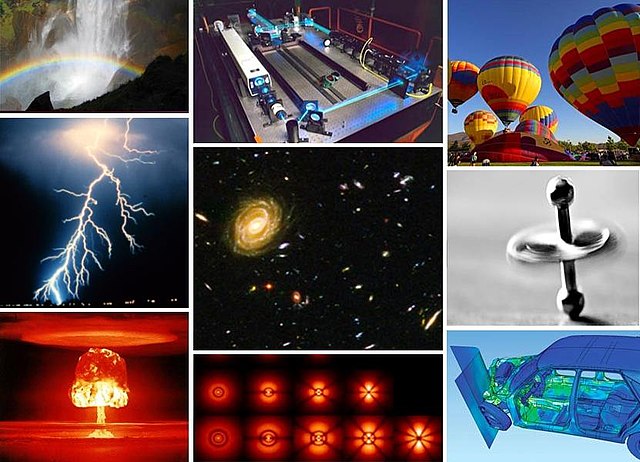পদাৰ্থ বিজ্ঞান
From Wikipedia, the free encyclopedia
Remove ads
পদাৰ্থ বিজ্ঞান (ইংৰাজী: Physics) হৈছে প্ৰাকৃতিক বিজ্ঞানৰ এটা গুৰুত্বপূৰ্ণ শাখা য'ত স্থান-কালৰ মাজেৰে পদাৰ্থ, ইয়াৰ গতি আৰু আচৰণকে ধৰি অন্যান্য সংযুক্ত ধাৰণাসমূহ; যেনে শক্তি আৰু বল ইত্যাদি বিষয়সমূহ অধ্যয়ন কৰা হয়।[1][2] বুনিয়াদী বৈজ্ঞানিক অধ্যয়নৰ ক্ষেত্ৰসমূহৰ ভিতৰত পদাৰ্থ বিজ্ঞান অন্যতম আৰু ইয়াৰ মূল উদ্দেশ্য হৈছে প্ৰকৃতিৰ পৰিঘটনাসমূহ পুংখানুপুংখভাৱে অধ্যয়ন কৰা। [টোকা 1][3][4][5]

পদাৰ্থ বিজ্ঞান প্ৰাচীন বিদ্যায়তনিক বিষয়সমূহৰ ভিতৰত অন্যতম। সম্ভৱতঃ জ্যোতিৰ্বিজ্ঞানৰ অন্তৰ্ভুক্তিৰ ফলস্বৰূপে ই প্ৰাচীনতম বিদ্যায়তনিক বিষয় হিচাপে স্বীকৃতি লাভ কৰিছে।[6] শেষৰ দুটা সহস্ৰাব্দলৈ পদাৰ্থ বিজ্ঞান, ৰসায়ন বিজ্ঞান, জীৱ বিজ্ঞান আৰু গণিতৰ কিছুসংখ্যক শাখা প্ৰাকৃতিক দৰ্শনৰ অংশ আছিল যদিও ১৭ শতিকাৰ বৈজ্ঞানিক বিপ্লৱৰ সময়ছোৱাত এই প্ৰাকৃতিক বিজ্ঞানসমূহ সিহঁতৰ নিজস্ব অধিকাৰত একক অনুসন্ধান প্ৰয়াস হিচাপে জ্ঞাত হয়। [টোকা 2]
Remove ads
টোকা
- The term "universe" is defined as everything that physically exists: the entirety of space and time, all forms of matter, energy and momentum, and the physical laws and constants that govern them. However, the term "universe" may also be used in slightly different contextual senses, denoting concepts such as the cosmos or the philosophical world.
Remove ads
তথ্যসূত্ৰ
বাহ্যিক সংযোগ
Wikiwand - on
Seamless Wikipedia browsing. On steroids.
Remove ads
